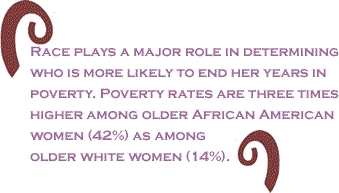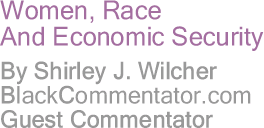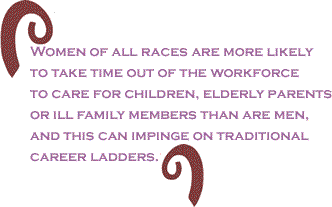
|
||||||||||||||||||||||
 |
||||||||||||||||||||||
 |
||||||||||||||||||||||
 |
||||||||||||||||||||||
 |
||||||||||||||||||||||
 |
||||||||||||||||||||||
 |
| The current issue is always free to everyone |
|
|
 |
It will not come as a surprise to many African Americans that, as a group, we are less secure economically than our white counterparts. What few may know, however, is that African American women are hit harder by poverty in their senior years than most other groups, including African American men. In fact, elderly women of all races are nearly twice as likely to be poor as are elderly men, and the risk of poverty increases as women age. Race plays a major role in determining who is more likely to end her years in poverty. Poverty rates are three times higher among older African American women (42%) as among older white women (14%). This reflects the economic disadvantages that African American women face in their earlier years as compared to men and to white women. For instance, according to data released in 2004 from the U.S. Census Bureau, African American women working full-time for a full-year earned $26,992 in median annual earnings, compared with $32,036 earned by comparable white women workers. That’s almost 16% less for black women. Non-economic factors also influence the success of African
American women in the workplace, including levels of education,
job flexibility Women of all races are more likely to take time out of the workforce to care for children, elderly parents or ill family members than are men, and this can impinge on traditional career ladders. When women return to the work force they are considered “off track” and often face limited opportunities for advancement and smaller paychecks than they would have received had they remained continuously employed. These care giving responsibilities may disproportionately impact African American women because their families have less income with which to purchase professional care-giving assistance. Over the years these disparities in income are compounded. Lower incomes translate to less money saved for retirement, less interest earned in a 401k or other program, and less capacity to invest in asset building activities. Perhaps even more important is the fact that Social Security benefits are still based on a traditional family structure - a working spouse and a stay-at-home wife - so women’s care-giving obligations can lead to economic hardship in old age. This is particularly daunting when one considers that according to the most recent data, Social Security is the only source of income for three out of ten retired elders. These differential opportunities that African American women experience when young and in mid-life do, over time, result in what sociologists have called cumulative disadvantage, meaning that those who lack higher education, good family connections, strong and continuous work history and jobs with benefits often fail to acquire adequate resources to carry them through their elder years. This is not because they are irresponsible or spend thrifts; it is because of systemic disparities that disproportionately impact women and people of color.
This is why the Elder Economic Security Initiative (EESI) is an important step forward for America’s seniors, especially women and people of color. Wider Opportunities for Women, a national organization that promotes accurate measures of income and assistance needs of families and the elderly, introduced the Initiative earlier this month (May 2008).
At present data is available for counties in the states of California, Massachusetts and Pennsylvania. By the end of June, data will be available for counties in Wisconsin and Illinois and by the spring of 2009 an additional five states will be added. Ultimately, there will be a national database that may be accessed online. The Elder Economic Security Initiative can provide important information to policy makers, advocacy organizations, activists and others to help them develop programs and policies to ensure the economic independence of all of America’s senior citizens, regardless of race, color or gender. We can’t fix the system’s inequities overnight, but we can take action to help ameliorate those inequities right now, through the Elder Economic Security Initiative. BlackCommentator.com Guest Commentator, Shirley J. Wilcher, is currently the Executive Director for the American Association for Affirmative Action. She was formerly Deputy Assistant Secretary for the Office of Federal Contract Compliance Programs (OFCCP), in the Employment Standards Administration of the U.S. Department of Labor in the Clinton Administration. Click here to contact Ms Wilcher.
|
Your comments are always welcome. e-Mail
re-print notice
If you send us an e-Mail message we may publish all or part of it, unless you tell us it is not for publication. You may also request that we withhold your name. Thank you very much for your readership. |
|
| May
8, 2008 Issue 276 |
|
| Executive Editor: Bill Fletcher, Jr. |
| Managing
Editor: |
| Publisher: Peter Gamble |
| Est. April 5, 2002 |
| Printer Friendly Version in resizeable plain text format format or pdf format. |
 |
 |
 |
| |
| |































